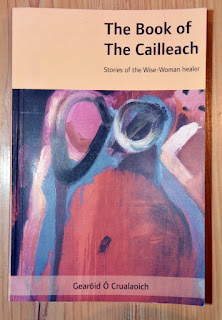
The contemporary relevance of our most ancient myths
 |
| The Book of the Cailleach. |
The book's blurb says that, "In the hands of Gearóid Ó Crualaoich these figures are subtly explored to reveal how they offered a complex understanding of the world, of human psychology and its predicaments. The thematic structure of the book brings to the fore universal themes such as death, marriage, childbirth or healing, and invites the reader to see the contemporary relevance of the stories for themselves."
But it was a review of The Book of the Cailleach - contained on its back cover - that drew my attention. It voices, in ways that I struggle to do, the relevance of these stories to the Ireland - and the world - of today:
"The unearthing of a priceless spirit from forgotten, buried, misunderstood storytelling is like discovering Knowth or Newgrange and opening the doors to those otherworlds. Gearóid Ó Crualaoich's work on the wise-woman healer, the cailleach, is of immense importance, for we need access to the secrets of healing and orientation in life known well in the past but now neglected. Without that secret knowledge we are left with mere rationalism and secularism, which are inadequate for dealing with the challenges of a complex world. This book is highly professional, comprehensive, carefully interpretive, and respectful. It opens up many avenues towards the healing of our own personal lives and our world. It is of special importance to Ireland, but it also addresses the needs of people around the world, who can now look to Ireland for the rediscovery of a special kind of spiritual knowledge connected to the natural world, to place, and to history. This book is so rich in detail and implication that it can be taken by the reader as a personal map to the otherworld and to the forgotten powers of nature and humanity now accessible to him. To women especially it offers an image of strength, wisdom, and healing power. We need this kind of excellent work, visionary as well as academic, all over the world to pull us out of the literalistic and materialistic vision that is limiting us and perhaps even killing us."
That review was by Thomas Moore, author of Care of the Soul and The Soul's Religion.
Nuala Ní Dhomhnaill also sees the relevance of the work to current times. She describes it as a "breathtaking book" and one which resonates quite personally with her:
"It returns to Irish folk material the emotional depth and imaginative meaning which it always contained in its natural context but of which it has often been stripped by the more utilitarian and commonplace interpretations long in fashion. It reminds me once again why I am charmed and enchanted by this material, and more than that, why I regularly find in it answers to the deep-seated obsessions of my own. A real gem of a book, containing an exemplary methodology showing how the Irish folk tradition can be interrogated to find answers which are vitally important to our age and times."
 |
| I've spent quite a bit of time at Loughcrew, exploring the monuments and landscape of the Cailleach. |
Bringing to bear the meaning of myth has become one of the most appealing aspects of my work. But this wasn't always the case. The reason I began to study the monuments of Brú na Bóinne almost 20 years ago (in reality, I had been studying them since I was a child, when my father brought home George's Eogan's newly published book on Knowth in 1986) was more to do with a belief that astronomy had a greater role in the design and interpretation of these great monuments than was being expounded by the experts. However, having begun serious research with Richard Moore in 1999, I decided just over a year later, on the 16th of March in the year 2000, to establish a website which would discuss aspects of our researches. When it came to choosing a title for this website, I quickly (and without giving it too much thought to be honest) decided to call it Mythical Ireland. Why? I wasn't entirely sure then. Perhaps I acted out of some instinct.
Whatever the reason, over time, myth has become the most important aspect of my work. And that's because, for me, personally, the retelling of our myths has led to revelation. Ní Dhomhnaill is right. The interrogation of our folk and mythic traditions leads to answers which "are vitally important to our age and times".

